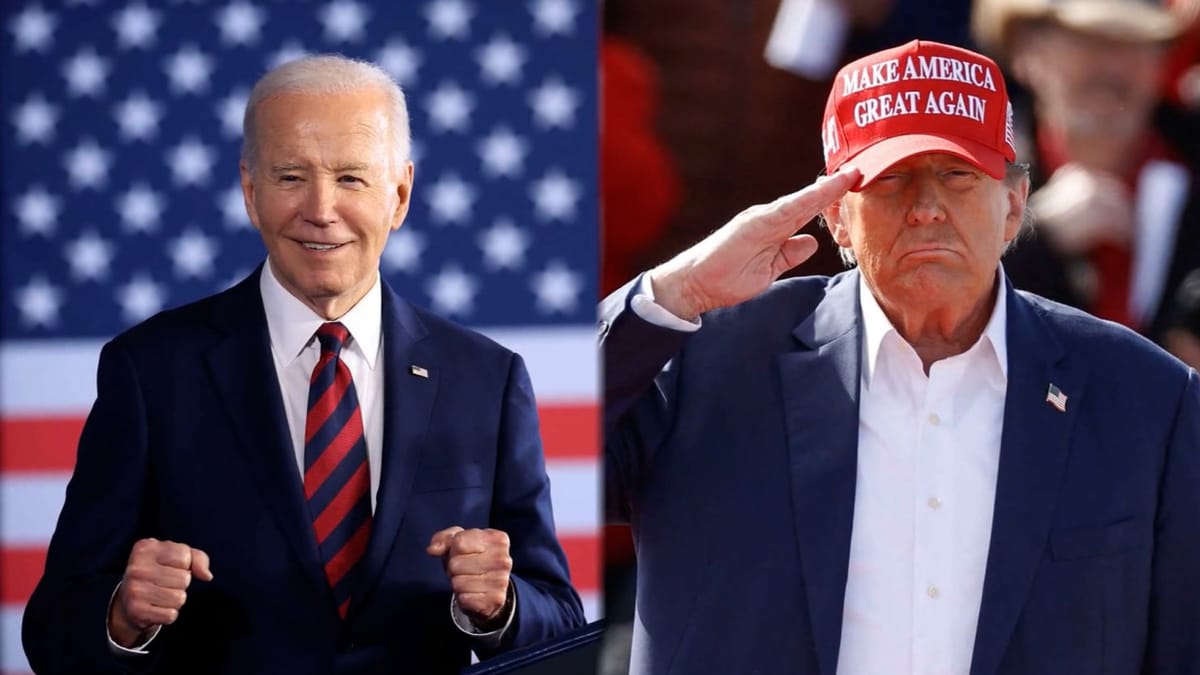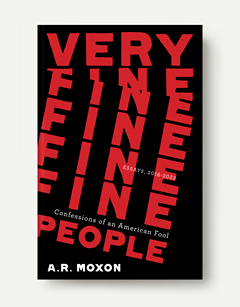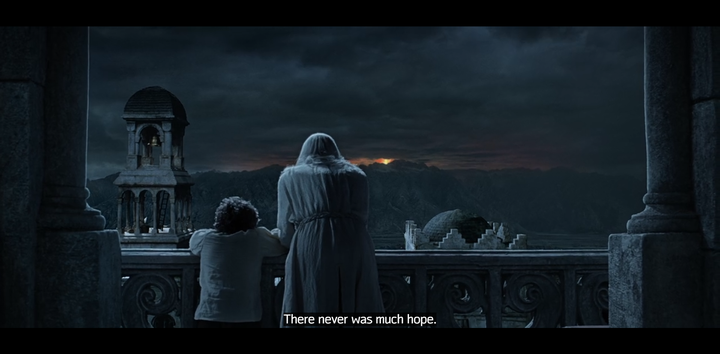Binaries and Illusions of Binaries
What I talk about when I talk about the election. Building an anti-fascist coalition that knows how to fight fascists and each other. Differentiators: Part 1 of whatever.

We’re dealing with rising fascism both globally and domestically, as I might have mentioned once or twice recently—“domestically” for me meaning the United States, though maybe you find it is true in your part of the old cosmic blueball, too. I think there are a lot of people who realize that fascism is on the rise and agree that it should be stopped, and that’s good for people who want to stop fascism’s rise—people who I am going to assume includes you, the reader of this. Isn’t that nice of me?
1) Fascism is on the rise.
2) It should be stopped.
Two points of agreement. I feel like political coalitions have been built on less. For example, here in the U.S., the fascist coalition is built on a belief in its own supremacy over others and its national myth of purification that desires ever-accelerating eliminationist violence against those it demonizes and marginalizes and menaces and kills, violence it frames as self-defense and law and order. Supremacists have their differences on what types of supremacy should be most supreme, and exactly how the violence should be enacted, and how brutal it should be, and who should receive what share of the profit from it, but those two beliefs have formed a powerful adhesive that nothing, up to and including observable reality, has broken yet—which is, I think, why fascism is on the rise.
I think an anti-fascism coalition would be bad for fascism, by and large. I think if an anti-fascism coalition fell apart it would be good for fascism.
These strike me as obvious things to say, but I mention them because I think they indicate it's highly likely that fascists are doing what they can to make any anti-fascism coalition fall apart. (This is the sort of incisive commentary for which I’m so justly semi-well known in certain specific online circles.)
So, there are a lot of us who agree that fascism is on the rise, and that it should be stopped. However, I notice there’s quite a lot of disagreement past those points of agreement. I should be clear, I don’t think these points of disagreement are immaterial, nor do I think they should be ignored. Not everyone is equally right and equally wrong within these arguments, and some points of disagreement even involve ways that those of us in the anti-fascist coalition are actually aligning ourselves with supremacist beliefs, which means aligning ourselves at least partially with rising fascism instead of against it, so it’s actually going to be important for us to have these arguments with each other, both so that we can become more effectively anti-fascist as a coalition, and to free ourselves of our supremacist assumptions and alignments and beliefs, and become more spiritually healed and generative individuals.
It probably shouldn’t surprise us, incidentally, to find many people in an anti-fascist coalition aligned at least partially with supremacist beliefs. Supremacy and its unsustainable foundational lies of individualism and earned worthiness and redeeming violence are inherent to my nation, which is the United States; these lies were present at our nation's very founding, can be found threaded through all our self-aggrandizing myths. Maybe you live in a similar nation, or maybe you don’t—but we marinated in those supremacist myths since birth, most of us United-Staters; little wonder our grey matter took on at least some of that supremacist flavor.
And fascists act in fathomless bad faith, so it should also not surprise us to find fascists secreted within an anti-fascist coalition, posing as something other than they are, to better effect fissures and splits between different factions of that coalition, to try to fool people into taking on eliminationist supremacist beliefs from an anti-fascist position, and to try to peel away from the coalition the support of people who are still fooling themselves and clinging to their old supremacist beliefs. An anti-fascist coalition is bad for fascists, after all. We should expect to see fascists getting simultaneously sly and brutal, to try to bust it up.
What I'm thinking about today are differentiators.
I think it would be good if we could figure out how to differentiate, both between our truly anti-fascist beliefs and our stubborn supremacist beliefs, and also how to differentiate between good faith (if often flawed) anti-fascism and bad faith fascists posing as some flavor or another of anti-fascist. I think that would be good, because I think anti-fascist coalitions are bad for fascism. Since I am anti-fascist, I would like to see the anti-fascist coalition hold together for that reason, and I would not like to see it split over its differences, even if those differences are significant and important and multitudinous, and the conversation being had over these differences is vital to becoming better people and becoming more effective anti-fascists. I’d like to see these conversations happen without devolving into the sort of fights that split coalitions, if they can. And if you’re thinking “too late,” well, maybe, but I hope not, and I also hope you can forgive me for hoping that.
Put another way: I’m not against fights. I just want us fighting the most fascism we can, the hardest we can, the best we can. And so I’ve been thinking about what that looks like. This is my best try. You might like it, but we’ll see. I had to use my own brain to come up with this, and frankly it isn’t always up to snuff.
I guess what I’m saying is, what I’d really like more than anything is to get everyone yelling at me and I suppose each other in the comments, so let’s do something really fun. Let’s spend several weeks talking about the upcoming election in the United States.
There is an election, you know. It's upcoming.
“The presidential election” is how it’s going to be framed, although there are going to be a lot of other things on the ballot, too, and you might think about that a bit as you think about how you intend to interact—for the very last time, maybe—with something that we in the United States call “democracy.”
Why discuss the election?

My next book is called Very Fine People: Confessions of an American Fool. It's coming out in June, and my readership is helping me get it out into the world. If you want the details on how you can get in on that and get a signed copy and my thanks in the acknowledgements section of the book (offer closing on Thursday 3/21), click this link.
It’s a good question. Why talk about the election? Isn’t everybody else doing enough talking about the goddamn election for our taste?
Maybe so.
But at least some of us in the anti-fascist coalition think that the outcome of this election will determine whether fascism’s rise is going to continue at its current pace or whether it is going to accelerate at roughly the speed of an ocean submersible implosion. And even if that isn’t true, one candidate is bringing some novel new forms of fascism onto the table that the other is not, and is offering acceleration on all existing points of eliminationist violence while opening up plenty of novel new forms of a particularly brutal and systematic variety, and an even more accelerated demonizing and dehumanizing language along pretty much every imaginable form of bigotry, so the election might well be an (not the but an) important inflection point in the struggle against fascism, and I think most if not all of us anti-fascists agree about that.
Touching closer still to the point of an anti-fascist coalition, the election forces certain binaries (will you vote for X or Y? will you vote or won’t you?) and illusions of binaries. Binaries and illusions of binaries are amongst the most useful weapons¹ for fascists who are trying to sow divisions within an anti-fascist coalition. So I think that the election is also probably an inflection point in the struggle for fascism’s rise, as fascists try to create points of division in what might otherwise be an anti-fascist coalition that might stop or slow them. Put it this way: a lot of people think the election will matter, but few seem to think it matters more than the most proud and open fascists.
Anyway, there’s going to be an election in November, and we the people will decide on who is to be the president from roughly 2025 through 2028, and on a bunch of other things, too, and a lot of people don’t feel very good at all about the available options. Maybe you have heard about this on The News. At least one of the parties is fascist, which is sort of bad news if are a human being and you like living, etc.
It occurs to me that I should probably unpack that part, the "at least one of the parties” part, the part that suggests that on some level both parties are fascist.
Some of us are anti-fascist, and, though we have a fairly broad spectrum of enthusiasm (or lack thereof) for different Democrats, and a fairly broad spectrum of opinion around the relative successes and failures of different Democrats, we also see Donald Trump as a unique and very credible threat to global stability and an accelerant to the demolition of democracy and the rise of fascism, supremacism, and eliminationist violence, in a way that Democrats are not. The idea being that preventing Trump and Republicans from regaining the power of the executive or the Senate and various state and local governments—or retaining the power of the House and various other state and local governments—is a paramount priority toward preventing the total and complete domination of a form of fascist supremacy and eliminationist violence that most of us in the United States haven’t experienced in our lifetimes.
Meanwhile, others of us are anti-fascist and don’t really see any significant difference between Joe Biden and Donald Trump, between Democrats and Republicans—this, because of the unfortunate tendency of Democrats over the decades to accommodate current supremacist framing and to align with existing supremacist systems of eliminationist violence—which means that some of us anti-fascists think that Democrats are not a hedge against rising fascism but rather willing partners in it. Some of us may be so disillusioned by this habit of fascist accommodation that we have come to believe the outcome of the election doesn’t matter very much, or even at all. The idea being the system itself is so corrupt and violent that the only thing that can result no matter who prevails is a sort of undifferentiated corruption and violence.
Probably one or both of those descriptions just made you want to yell at me and others about the election. I promise you’ll get your chance, but just keep your britches on. We’re over halfway done here.
You might believe parts of one description and parts of another, or you may see yourself in one of these camps but not agree with some aspect of it, or maybe you see yourself partially in both of these camps to varying degrees. The whole thing is a bit more of a spectrum, I know, but if I unpack all the different popular iterations fully we could be here all day, and damn. What I just presented is a binary of likely voters and unlikely voters/anti-voters, which is reductive, so I’m sorry about that, but at least you now see what I mean about the election creating binaries and illusions of binaries.
And I myself fall somewhere within this spectrum, of course. I’m not going to be coy about my position forever, and you can probably guess where I am if you’ve been reading me for a while, but I’m not going to tip my hand yet about where I am specifically situated—because once I do, that’s when you’ll probably want to either start agreeing with me (and others) or yelling at me (and others), and even though I know that agreeing with people and yelling at people is the most useful possible thing we could all be doing vis-à-vis the election or anything else, I am first and foremost an egocentric author, which means I want you to read the rest of what I’ve written first.
Anyway, these are pretty significant differences of opinion we’re facing between people who honestly want to prevent fascism’s rise, and these differences get us anti-fascist folk fighting with each other a lot, especially on social media, and especially (it seems to me) about voting and the election.
And I’m not against fights, actually.
I would like to see if we can fight each other in ways that make us more effective at fighting fascists, though. So let’s just say up front, I’m only talking to anti-fascists here. If you’re thinking “well a lot of those [likely voters/unlikely voters] are fascists” … yes, good show. Quite right. I’ve noticed that, too. I’m not talking about those ones. Just the anti-fascists, of which you are one, and so am I, and good for us, too.
Again, I’m not against fights, I just want to fight fascism, and I want us fighting the most fascism we can, the best we can, the hardest we can, as effectively as possible.
And again, what I’m thinking about here is differentiators.
Since the context for these thoughts is the upcoming U.S. election, I’m thinking about differentiators for politicians, to begin with. Any candidate that wants to win an election has a couple options that involve differentiating themselves in order to compel people to vote for them: either they can try to categorically differentiate themselves from other candidates, by aligning themselves with under-served constituencies in as sharp or as clear a way as possible, and trusting that they’ll bring along enough of the rest of their coalition to prevail. Or they can draft closely to their opponent’s position, and offer a differentiated variant of the same brand of whatever product the opponent is offering. This can work if the politician thinks they can offer the same thing but better, in order to siphon their competition’s support away. It’s like when Pepsi came in and said, “Hey, we’re Coke but we’re less flavorful!” or whatever the hell Pepsi’s pitch was.
A fascist politician has a pretty easy way to differentiate themselves. All they have to do is offer more eliminationist violence and a more bigoted rationale for it than anybody else is offering. If anybody else agrees to give fascist voters the amount of eliminationist violence the fascist politician is offering, then they can immediately offer even more violence against even more people, and offer to make it even more brutal. Voters who want eliminationist violence and bigoted rationales will always support the candidate offering more violence and a more bigoted rationale, no matter how much the candidate offering these things also betrays every other value those voters claim to revere—as I think Republican voters at least have clearly proved beyond doubt’s shadow by now.
This is all just basic marketing stuff, but it perhaps explains why America’s aspirational Hitler got his start selling mail-order steaks that taste like the soles of Converse All-Stars.²
To my mind, the better way to differentiate, (and healthier, especially against fascists), is to create a categorical differentiation—in other words, to go where the fascist candidates can’t go, because if the fascist candidate went there, they would lose too much support from their core constituency of fascists and other types of supremacist, and thus lose the election and thus lose power and influence and money they could otherwise spend on items of flair like flag lapel pins and federal judges. In other words, a categorical differentiator is when you offer fresh-squeezed orange juice instead of cola, which is sugar water that might give you diabetes or cancer.
One advantage of such a categorical differentiation is that it's much clearer. I’d say if you want to siphon off voters from your opponent by taking on positions similar to them, you’d better be very precise and sure that you can offer the same thing but better, because otherwise what will happen is you won’t be offering anything to anybody willing to buy from you. (And if you’re up against fascists, you shouldn’t be offering fascism at all … but come back next week and we'll really get into it.)
So that's differentiators for politicians.
I also think about differentiators for ourselves. As I mentioned, we in the anti-fascist coalition still harbor, to one degree or another, our own supremacist beliefs and alignments, which reveal themselves in lots of different ways. I’m really good at seeing the way supremacists beliefs appear in some of your words and action. I’m less good at seeing the way it comes out in my own speech and action. (Maybe this means I’m the perfect one. Here’s hoping!)
What I’d like to do is think about how each of our (very broadly defined) factions within our anti-fascist coalition encounter each other, using the election as a specific context. I’d like to look at the ways each of us is fooled into supremacist beliefs, and some of the ways I think we’re fooling ourselves (without making the mistake of believing we're all equally fooled); I'd like to ponder the ways that various anti-fascist factions might still contribute to an anti-fascist effort despite its errors or imperfections; and then I'd like to try to land on what it looks like to be an anti-fascist likely voter or an anti-fascist unlikely voter that more effectively differentiates itself from fascists, no matter our faction.
So next time we’ll look at the anti-fascist likely voters.
And then we’ll look at anti-fascist unlikely voters and never-voters.
And then, if it’s helpful (maybe? I’m not sure), we’ll look at the election the way I think fascists see it.
I’d like to keep this orderly, so please wait patiently until it is your turn before you start yelling.
The Reframe is supported financially by about 5% of readers.
If you liked what you read, and only if you can afford to, please consider becoming a paid sponsor.
Click the buttons for details.
Looking for a tip jar but don't want to subscribe?
Venmo is here and Paypal is here.
A.R. Moxon is the author of The Revisionaries, which is available in most of the usual places, and some of the unusual places, and the upcoming essay collection Very Fine People, which you can learn about how to support right here. He is also co-writer of Sugar Maple, a musical fiction podcast from Osiris Media which goes in your ears.
Earth people, he was born on Jupiter.
¹ Their first weapon is surprise, surprise and fear, fear and surprise are their two main weapons, and illusions of binaries—three. Their three chief weapons … look, I’ll come in again.
² I assume.




Comments ()